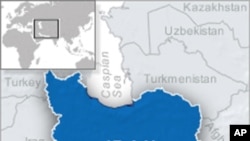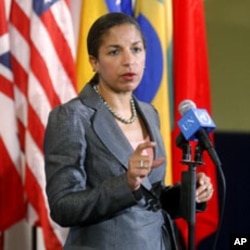Iran lost its bid on Wednesday for a seat on the executive board of the new U.N. Women's Agency. The new agency will seek to promote and protect women's rights around the world.
The vote took place in the U.N.'s 54-member Economic and Social Council, or ECOSOC.
Forty-four countries from across the U.N. membership were vying for 41 seats on the U.N. Women's executive board. Thirty-five of the seats were allocated regionally and six were reserved for major financial contributors.
The new agency, headed by former Chilean President Michelle Bachelet, merges four U.N. agencies that deal with women's issues into one entity. It will have a start-up budget of a-half-a-billion dollars.
In three of the groups -- Africa, Western Europe and others, and the financial contributors -- there were as many candidates as vacancies, so those countries were approved by acclamation.
But in the Asian category, where until recently there were only 10 candidates for 10 seats, Timor-Leste put forth its candidacy last week and turned the vote into a contest in which Iran fall short. Iran received only 19 of the 54 votes cast; at least 28 were required.
The United States won an uncontested seat on the board because it is a major financial contributor to women's programs at the United Nations.
U.S. Ambassador Susan Rice told reporters that the results of the election will allow the new agency to be launched with a strong foundation. She was asked what she thought of Iran's failure to win a seat and Saudi Arabia's successful bid.
"I am not going to deny that there were several countries that are going to join the board of U.N. Women that have less than stellar records on women's rights and, indeed, human rights," she said. "But what happened today in the ECOSOC Council, when we had a vote on a handful of slates, and one of them was, of course, the contested Asian slate, where Iran had sought a seat on the board of U.N. women, they lost, and they lost handily."
"And the slate that was selected, including the late candidacy of Timor-Leste, is one that is largely comprised of countries that are committed to women's rights and have a good record of support for women's rights and human rights and we welcome that," she added.
Human rights groups had opposed Iran's candidacy. "We have concerns with several countries that are on the board, but what really set Iran apart is that not only do they have internally a dismal record on women's rights, but also the fact that they are aggressively trying to crack down on the women's movement inside Iran," said U.N. Advocacy Director for Human Rights Watch, Philippe Bolopion.
"They have been harassing, they have been sometimes arresting and going after women in Iran who speak out against the discriminations enshrined in the law," he added.
As for Saudi Arabia's seat on the executive board in the contributor's category, Bolopion said countries should not be able to buy their way onto the board. But he said he hoped that having a seat on the U.N. Women's Agency would bring more scrutiny on the deeply conservative kingdom's restrictions on women.
The 41 countries elected to the executive board will hold terms of two or three years each, determined in a lottery after the vote.













